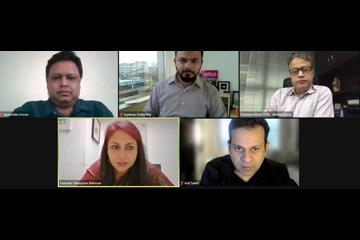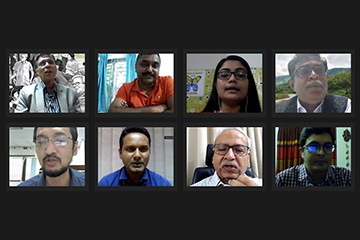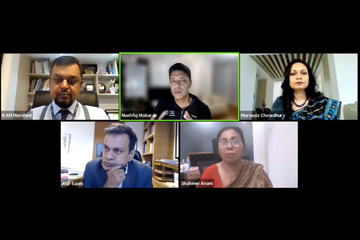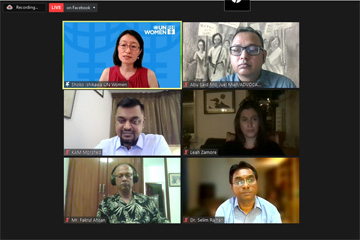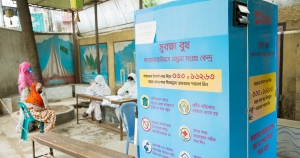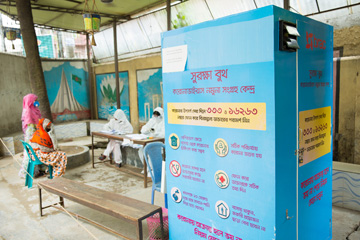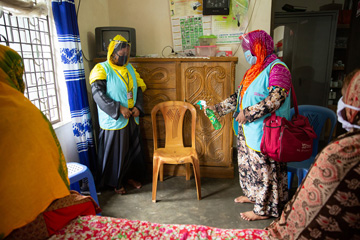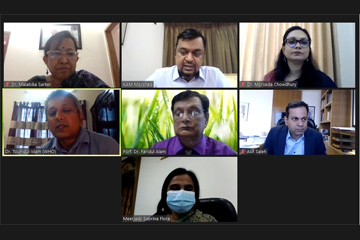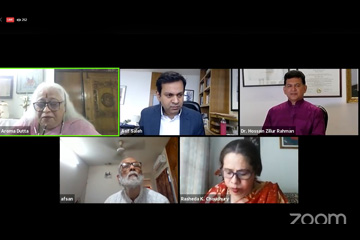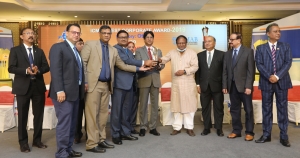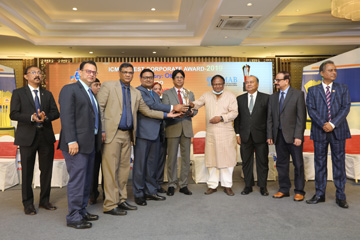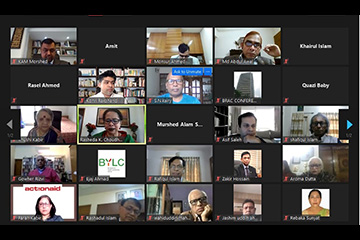
BRAC
Female employees, persons with disabilities neglected, sexual harassment prevention policies absent in 50pc workplaces
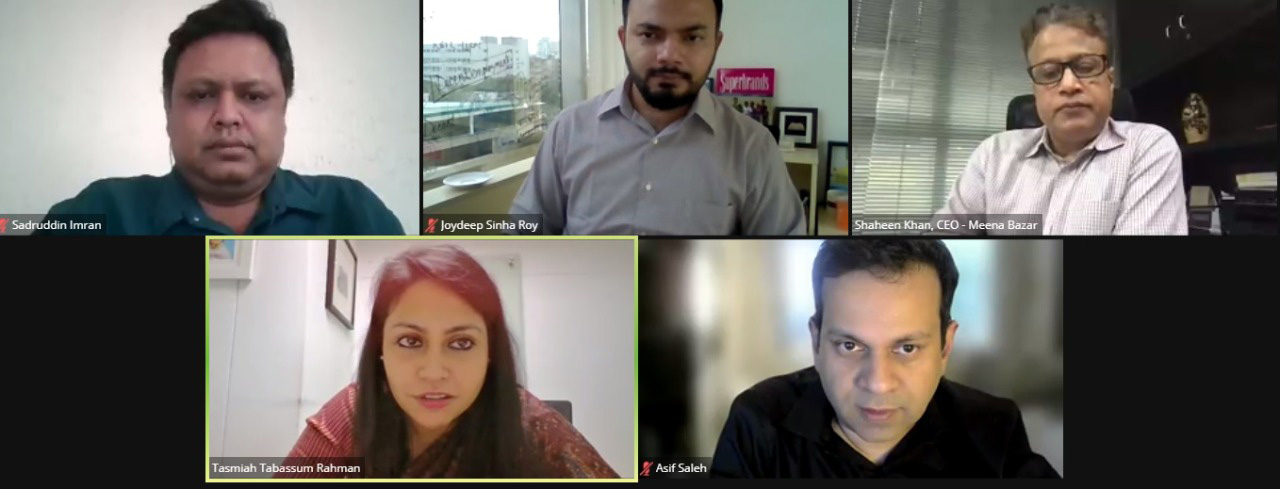
Retailers in Bangladesh are reluctant to hire female employees and persons with disabilities because of safety and security issues and the perception towards women that they have limited capacity to endure physical strain. Only 2% of the retailers are willing to hire persons with disabilities.
Retail employees work for an average of 11 hours a day in a single shift and mostly can avail annual leaves but are not usually granted maternity or paternity leaves. Only half of the workplaces have policies to protect their employees from sexual harassment.
These findings have come in a baseline survey by BRAC, conducted to create employable skills and decent work opportunities for the marginalised youth.
The findings of the survey were unveiled at a webinar titled “The future of skills and employment in the retail sector”, organised by BRAC’s Skills Development Programme (SDP) today on Tuesday (15 June 2021).
The survey also reveals existing skill gaps of the salespersons engaged in the sector. Of the employers 68% said their sales their salespersons are unable to meet the sales targets set for them by the management; 54% stated their salespersons lack communication skills; and 64.6% have mentioned that their sales staff’s knowledge of the products is inadequate.
But the good thing is most workplaces are equipped with safety equipment - 93% in Sylhet, 82% in Chittagong, 72% in Dhaka, and 56% in Khulna. Alongside, 98% of the retailers in Chattogram, 92% retailers in Dhaka, 89% retailers in Khulna and 56% retailers in Sylhet have made arrangements so that their sales staff get enough light, air and safe drinking water.
The findings of this survey were revealed at the event followed by a panel discussion. Organisers said BRAC’s skills development programme is working towards creating employable skills and decent work opportunities for marginalised youth. A retail sales module and a competency standard have been developed under this programme, which is the first retail sales module in Bangladesh to be accredited by the Bangladesh Technical Education Board (BTEB).
The survey, conducted under SDP’s “Progressing the retail sector by improving decent employment (PRIDE)” project, interviewed 720 respondents from the retail sector employers and employees based in Dhaka, Chattogram, Khulna and Sylhet. Funded by IKEA Foundation and UBS Optimus, the project in partnership with the retail sector and Bangladesh government will create a model to provide sustainable livelihoods to low-income urban youths.
Innovision Consulting Ltd carried out this baseline survey commissioned by BRAC’s skills development programme.
Panelists present at the discussion were Asif Saleh, executive director, BRAC, Shaheen Khan, chief executive officer, Gemcon Food and Agricultural Products Ltd, and SM Shahjahan, deputy director, Bangladesh Technical Education Board. TasmiahTabassum Rahman, head of business development and strategy (current in-charge), SDP, moderated the discussion.
BRAC currently provides training to the underprivileged urban youths through classroom-based and apprenticeship-based approaches. Of the total learners, 60% are female and 7% persons with disabilities. BRAC has partnered with the private sector to implement the training programme.
Identifying mindset and social barriers as the most important problem in the retail sector, Shaheen Khan said, “There needs to be a cultural and mindset shift for people to come and join in the retail be it management or non-management level. Even though entry-level employees learn fast, there is still a large chunk or group of employees who move quite frequently within the sector that remains a major challenge. The employees need to receive training regularly to gather skills, but it must have to be a continuous process so that the contents of the training are also revised regularly depending on the demand”.
Asif Saleh said, “Potentially employees will not be interested to gather skill if he/she does not get enough incentive despite being skilled. Also, stakeholders need to run campaigns to change the existing perception about the retail sector employment. BRAC and partners can work together on finding out the neediest people and arrange training for them so that potential candidates join the workforce after being skilled which will create a win-win proposition for all.”
BTEB deputy director SM Shahjahan said, “Recruiters must develop a hierarchy showing entry level of a potential candidate and the destination which will discourage recruits to frequently opt for a job switch. If the trained people get preference in entrances, it will help develop a training-oriented culture in the sector. Also, a person must be provided with a certificate after completion of training so that the employer can judge skills while hiring an employee.”
Environmental disaster: Only a handful of people are creating losses for all citizens in Bangladesh

Speakers at a webinar on Sunday urged people not to wait for anyone, rather actively work from their own position for protection of the environment.
They were speaking at a webinar titled “Role of youths in ecosystem restoration”, organized by BRAC climate change programme, to mark World Environment Day.
Like every year, World Environment Day was observed in Bangladesh as elsewhere in the world on June 5. “Ecosystem restoration” is the theme of the annual day this year. An ecosystem is a geographic area where plants, animals, and other organisms as like biotic or abiotic factors work together to form a bubble of life. Say for example, Sunderbans is a place of rich ecology. Half of the global GDP is depended on the nature and already at least 3.2 billion people are affected because of lost ecosystem services.
As chief guest of the event, Saleemul Huq, director of the International Centre for Climate Change and Development (ICCCAD) said, “There are laws for environment or ecosystem protection in Bangladesh, but those are rarely followed. The country is incurring different losses only because of the interest of handful of people. The youths must bring every issues related to environmental destruction in their neighborhood into attention and notify the concerned authorities about the activities.”
Mirza Shawkat Ali, Director (Climate Change & International Convention), Department of Environment said, “Swedish youth Greta Tintin Eleonora Ernman Thunberg, an idol in the climate change movement, has already proved that youths can bring changes, if they want. Many like Greta Thunberg will emerge in Bangladesh if we support the youths in Bangladesh.”
Rakibul Hasan Mukul, Executive Director, of Arannyak, thinks that it will turn into losses than benefits if we destruct ecology in the name of economic development. On the other hand, it will not be logical if we only think about ecosystem protection, because we also have to think about the need of people who are depended on ecosystem. If we can unite everyone involved in the process, only then we can make success in ecological restoration.”
Students from different universities and young professionals from different development and research organisations experienced their views at the webinar. Young researcher Anusree Ghosh said ecosystem of Chalan Beel faced massive loss when the highway was constructed upon it. She demanded proper survey on environmental loss before taking any development project in future.
Presiding over the webinar, Dr Md Liakath Ali, director of the climate change programme at BRAC and BRAC International, and the urban development programme at BRAC, said benefits of protecting environment is larger than what we think.
“Half of the global GDP is depended on nature. An investment of $100,000 to ecosystem restoration can bring benefits of $30,000. Implementation of 17 Sustainable Development Goals, including no poverty and zero hunger can make important contribution to ecosystem restoration,” he opined.
According to United Nations, ecosystem degradation impacts 3.2 billion people worldwide. Loss to economy will be $10 trillion by 2050 if loss to nature continues. The agricultural production will drop by 12% and food price will hike by 30% by 2040 if the ecosystem destruction continues.
BRAC teams up with partners to build community resilience against Covid-19
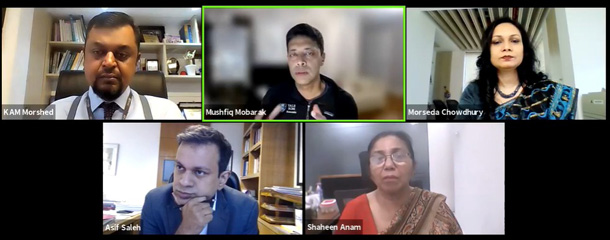
Distribution of 13 million masks in 35 high-risk districts begins
BRAC has undertaken an initiative to provide Covid-19 related services to people in 35 high-risk districts. The Directorate General of Health Services (DGHS) is actively supporting the identification of priority areas for this effort. It is for the first time in Bangladesh that any civil society partnership will provide Covid-19 services with such a wide coverage. Free distribution of 13 million masks in these districts is underway as the first step to this initiative.
Global Affairs Canada and BRAC are the primary contributors to this initiative, being supported by a consortium of donors and partners including the Australian government.
With a community-driven Covid-19 response and local-level health system strengthening approach, BRAC is partnering with the DGHS, recently formed platform Civil Society Organisation (CSO) Alliance, and United Nations agencies to implement this initiative. A total of 41 local NGOs in the identified districts will act as the implementing partners. BRAC’s executive director Asif Saleh made the announcement at a virtual press conference this morning (Tuesday, 1 June).
BRAC is going to deploy 27,500 community health workers in the selected 35 districts under this effort which will put maximum emphasis on the proper use of masks to ward off the transmission. The other approaches include spreading information and motivation about handwashing with soap and water, maintaining coughing etiquettes and social distancing and vaccine registration. Measures will also be taken to address misinformation and rumours around Covid-19.
The high-risk districts are Mymensingh, Sherpur, Kishoreganj, Tangail, Jamalpur, Gazipur, Narayangonj, Dhaka, Jhenaiadah, Bagerhat, Satkhira, Jashore, Chuadanga, Narail, Khulna, Magura, Brahmanbaria, Cumilla, Habiganj, Sylhet, Rajshahi, Chapainawabganj, Bogura, Joypurhat, Natore, Bhola, Barishal, Dinajpur, Rangpur, Lalmonirhat, Cox's Bazar, Chattogram, Feni, Noakhali, and Chandpur. BRAC also plans to scale up the initiative across Bangladesh if the situation demands so.
Moderated by BRAC’s senior director KAM Morshed, the virtual press conference was also attended by Mushfiq Mobarak, professor of economics at Yale University, and Shaheen Anam, executive director of Manusher Jonno Foundation. Dr Morseda Chowdhury, director of BRAC’s health, nutrition and population programme highlighted core components of the initiative in the press conference.
With the rise in the number of Covid cases and rate of deaths, besides the centrally run initiatives in Bangladesh, scaled-up community-level prevention efforts have become imperative at this moment. While the health facilities are struggling to provide essential treatment and care to the patients, many people at the community level are negligent in abiding by the preventive measures and hygiene rules. A scaled up community-driven approach can only address the situation at present as observed by health and behaviour change experts.
During the official announcement of this initiative, BRAC executive director Asif Saleh said, “Community resilience to prevent Covid-19 requires participation from the people of all walks of life, particularly leadership from the local communities. There is no alternative to follow health advisories till all the citizens are vaccinated in the country. Hence we are making an all-out effort to strengthen community resistance against Covid-19 and glad that 41 partner NGOs have joined us in this effort. We urge prominent opinion leaders to join our campaign to bring behavioural change in the community.”
Yale University professor Mushfiq Mobarak said, “Mask usage remains low in Bangladesh, particularly in the public places. A team from Yale University and Stanford University, have conducted a research in 600 unions of Bangladesh, which shows many people are averse to mask use because they lack knowledge about the need to use it, while many others do not wear it as they can’t afford to buy masks. The research also finds that the production of three-ply reusable surgical masks at a low cost is quite possible in Bangladesh. We believe BRAC with its countrywide coverage and strong base of frontline staff will be successful in implementing the initiative.”
Manusher Jonno Foundation executive director Shaheen Anam said, “The inevitable social responsibility arising from the crisis of the pandemic has led us to join this initiative with BRAC along with 41 other NGOs. Our aim is to make people aware of the gravity of the situation and increase their sense of responsibility. Combating the ongoing crisis will become easier if people are aware at every household.”
Earlier, BRAC in partnership with The Foreign, Commonwealth & Development Office (FCDO) of the Government of UK and under a joint initiative with the DGHS and Community Clinic Trust, piloted a community-driven Covid response and health system strengthening initiative in six districts over the past five months. The success of the pilot has resulted in the initiative for the 35 high-risk districts identified by the Institute of Epidemiology Disease Control and Research (IEDCR). The initiative with three key pillars of interventions, namely, prevention, response to Covid case management, and promotion of vaccination is expected to slow down the spread of Covid-19, help flatten the curve and preserve health system capacity in these districts.
Prevention: BRAC’s observation shows that a decrease in mask use is directly related to an increase in the Covid positivity rate. Hence, the initiative will put a strong focus on ensuring mask use, hand hygiene and social distancing through household education. Community groups will be engaged in awareness activities and rapid response. In addition, local government officials, volunteers and community leaders will be empowered with knowledge on Covid-19 related issues to ensure preventive behaviours at the hotspots such as mosques, transport hubs, markets and shops. Periodic assessments will also be conducted to check the level of behavioural change in the community.
Response: Frontline health workers will lead the syndromic surveillance at the household level. BRAC’s proven community support team (CST ) model will be scaled under this initiative that will work to identify suspected Covid-19 cases by household visits with potential cases to conduct screening. Individuals matching with sets of clinical criteria will be connected to the telemedicine services for further support. These households will also receive information on home management of mild and moderate cases, possible referral points and testing facilities, quarantine protocols and best practices to prevent further spread of infection among the other household members. Follow-ups will also be conducted to ensure quarantine compliance.
Vaccination: BRAC and partners will support the local government health offices for Covid-19 vaccination registration and mobilisation. Health workers and volunteers will actively engage in addressing myths and rumours creating vaccine hesitancy at the community level. Furthermore, vaccination will also be promoted through miking and message dissemination via TV and radio channels, print and online mass media and social media.
Demographic and socio-economic changes induced by the Covid-19 pandemic
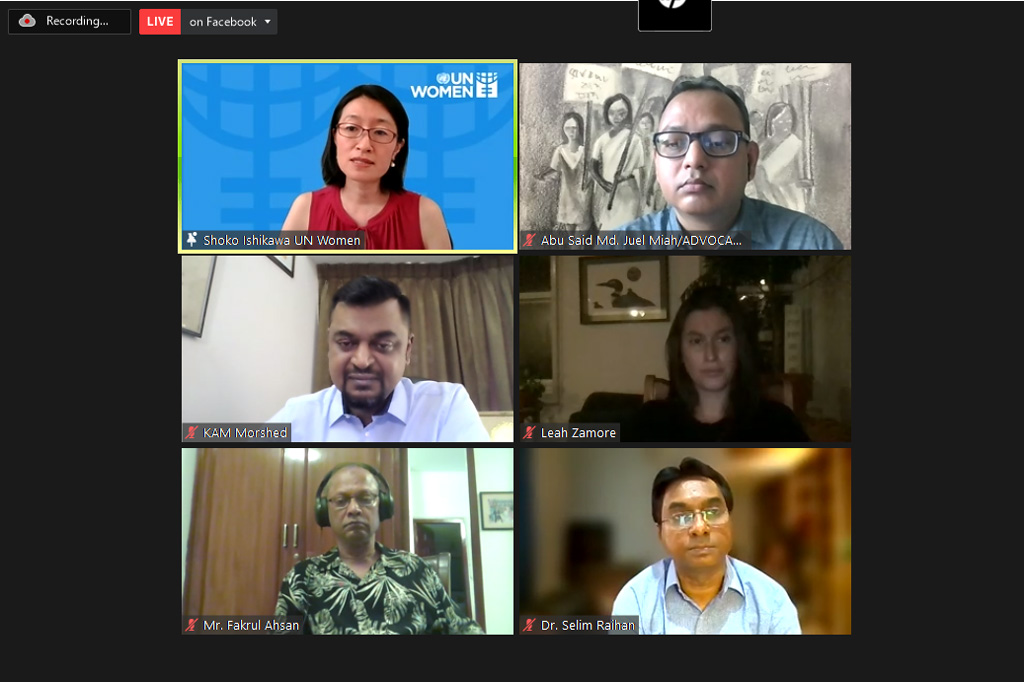
77% of the returnee migrants struggling to find jobs, child marriages saw 26% jump in two years
Around 77% of the returning migrants in Bangladesh were struggling to find a job between April and November last year because of covid-19 pandemic. Among the migrant households with returnees, 61% had at least one member who lost a job or earning opportunity during the covid-19 pandemic.
More than three-fourth (77%) of the marriages that took place in households during surveyed period had brides who were under the age of 18, which is 26% higher than the national rate of child marriage (51%) in 2018. Child marriages were found to be more prevalent in rural areas (81%) than in urban locations (70%).
These are the outcomes of a research jointly conducted by BRAC, UN WOMEN Bangladesh and the Center on International Cooperation at New York University. The research looks into the changes in demographic, economic, and social environments in secondary towns, peri-urban (upazila), and rural areas brought on by the reverse migrations during the COVID-19 pandemic.
Findings of the research titled “Demographic and socio-economic changes induced by the Covid-19 pandemic: Challenges of new circumstances” was unveiled at a virtual policy dialogue today morning, Saturday (08 May 2021). A panel of distinguished experts, academics, policymakers, and development professionals shared their valuable insights at the dialogue. They also discussed the policy priority areas identified by the study findings and way forward.
Dr. Shamsul Alam, Member (Senior Secretary), General Economics Division, Planning Commission attended the dialogue as the Chief Guest. Representatives from the Ministry of Expatriate Welfare and Overseas Employment, the Ministry of Women and Children Affairs, South Asian Network on Economic Modelling (SANEM), Dhaka University, the Center on International Cooperation at New York University, UN Women Bangladesh Office, UNDP Bangladesh, and BRAC joined as discussants.
A survey was conducted with 6,370 households during 10-25 December 2020 as part of the study that applied both quantitative and qualitative techniques. The survey considered April-November 2020 as reference period. The study calls attention specifically to the impact of the COVID-19 on internal and international migration, including returnee migrants who were forced to return to their places of origin due to various circumstances during the pandemic.
One-fourth (25%) of returnee migrant households are concerned over repaying their outstanding migration loans, which amount to an average of BDT 76,000 (around USD 900), and a maximum of BDT 700,000 (around USD 8300), the study found. Around 44% reported that they could not find any income-generating work and some of them are managing expenses by withdrawing from savings or using rent from assets.
The surveyed households reported a 58% decrease in monthly remittances received on an average during the pandemic that is in stark contrast with the national reports of higher flow of remittances during this period. However, a plausible explanation lies in previous researches that suggest almost half of the remittances received by the households under normal circumstances are through unofficial channels (such as hundi houses, travelers carrying money, etc.), which were unavailable during the pandemic.
The returnee migrant families will put pressure on the existing limited resources, especially in education and health sectors. The study found that 4.57% amongst the returnee population were school-aged children (age 5 to 16 years). If these children cannot return to their previous schools after the schools reopen, the educational institutions in local host communities will be under pressure. Furthermore, 13.35% of returnees (both external and internal) are above 40 years of age, and 4.56% are above 50 years of age. They have a lesser chance of re-migration, which has significant implications for the health services, especially on the services related to non-communicable diseases.
The female returnee migrants, mostly internal migrants, have been subjected to heightened burden during the pandemic. They identified inability to engage in productive or income-generating work (74%), problems in moving freely in the streets and marketplaces (26.8%), problems in adjusting with local culture and absence of social utilities (20%), and increased burden of household chores and problems in child-rearing and ensuring their education (18%) as major problems faced by them.
In general, the economic disruptions caused by COVID-19 left many people jobless, especially in the low-income and informal economy. Around 34% of all surveyed households had at least one member who lost jobs or earning capacity and became economically inactive. Moreover, over three-quarters of sample households (77%) saw a decrease in their average monthly income during the pandemic.
The average monthly savings of households decreased by 62% on average, and household debt increased by 31%, as they depleted their savings and borrowing money to manage their daily expenses. The average monthly expenditure on the other hand fell by only 8.6%.
The study suggests that the expected crude birth rate in 2020 is 20.2 (per 1000 people) in the surveyed households which is higher than the national crude birth rate in 2018 (18.2). The average family size was found to be 4.7, which is higher than the pre-pandemic national average of 4.06 (HIES 2016).
After dissemination of the survey findings, chief guest of the policy dialogue Dr. Shamsul Alam, Member (Senior Secretary), General Economic Division, Bangladesh Planning Commission, said in his speech, “Forced migration created frustration among people, particularly for women. We have to think over how to create economic opportunities for them. We need a recovery plan -- budget is a kind of recovery plan.”
Ms. Shoko Ishikawa, Country Representative, UN Women Bangladesh stated, “Even without data, child marriage has been a problem. Migrants are seeing stress in loss of income. Social safety nets need to look into how to support these migrant families e.g. creating more jobs, finding the right kind of skills training.”
Dr. Selim Raihan, Executive Director, SANEM and Professor of Economics, Dhaka University opined, “When we are talking about recovery and coping strategies, these studies are very important. It is now time to involve all stakeholders including people’s representatives, business, led by the government, and talk about economic plus social recovery.
Download: Brief executive summary for policy dialogue
Download: Policy dialogue presenatation 8 May 2021
BRAC to start antigen test from Saturday
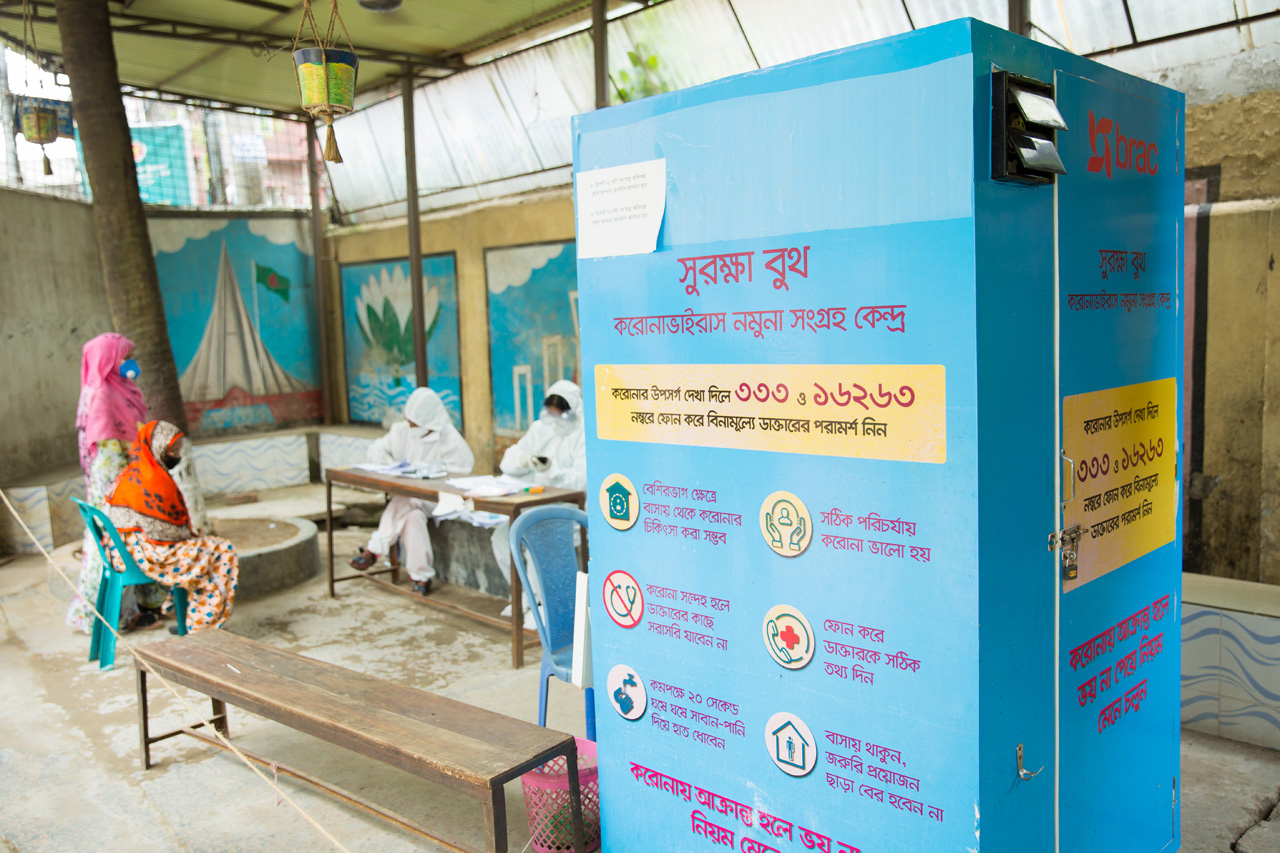
The activity will kick off primarily with 16 booths in Dhaka, Chittagong
BRAC will launch antigen-based COVID-19 rapid testing for suspected patients to get results within a comparatively shorter time period. The activity will be run under the overall supervision of the Directorate General of Health Services (DGHS). The service will initiate from tomorrow, Saturday primarily with 16 booths- 15 in Dhaka and one in Chattogram.
BRAC since March 2020 has been collecting samples to detect Coronavirus through RT-PCR test by installing testing booths (kiosks) in different parts of the country. It is now adding the Rapid Antigen Test to the existing facilities.
The plan to expand this activity has come amid the new surge in COVID-19 cases. The Rapid Antigen Test facility will gradually expand to BRAC’s 32 testing booths in Dhaka and 4 testing booths in Chattogram, according to the Health, Nutrition and Population Programme (HNPP) of BRAC.
The booths are open from 9am to 12 noon from Saturday to Thursday. Each of the booths will be able to collect and analyse 150 samples a day.
Currently, RT-PCR tests are followed in Bangladesh for the majority of the samples, which takes at least 24 hours or more to get the results. But, an antigen test will deliver the result within 30 minutes only, which, BRAC expects, will add pace to the government’s COVID-19 testing operations.
As part of its effort to support DGHS, BRAC is operating 41 walk-in sample collection booths in areas vulnerable to Novel Coronavirus across the country. These samples are transferred to government approved laboratories that deliver results after testing them in the RT-PCR process. Five of these booths are designated only to collect samples from the passengers going abroad.
Director of BRAC Health, Nutrition and Population Programme Morseda Chowdhury said, “Bangladesh’s health system got some time to prepare itself to deal with the first wave of COVID-19, but the second wave appeared too fast. To tackle the situation, there is no alternative to maintain health advisories, along with testing suspects and referring them for isolation. I hope taking the Rapid Antigen Test to the doors of the people will play an important role in this regard, as it will help speedy diagnosis and management of the patients.”
She further said, “The benefits of this initiative must be taken to all the regions vulnerable to COVID-19 for which assistance from all quarters is essential. At present, donor organisation The Foreign, Commonwealth & Development Office (FCDO) of the Government of UK is supporting BRAC and DGHS in this effort.”
Who and how to get the service
Anyone who has been referred by a registered physician, is experiencing COVID-19 symptoms like fever, dry cough, fatigue, sore throat and respiratory difficulties, or has been in contact with a confirmed COVID-19 patient, is eligible to undergo the test through BRAC operated booths.
A person must take an appointment online to get the service. The BRAC staff employed at the booths will assess the symptoms and case history of the suspect to decide whether it will be an antigen test or an RT-PCR test. If the result of a sample analysed via antigen testing detects the presence of the novel coronavirus, the service seeker will be notified within 30 minutes. Results of a positive patient tested via antigen testing will be uploaded in the website within three or four hours.
However, if a person’s antigen test results come back negative despite having symptoms, the sample will be retested using the RT-PCR procedure (sample from the patient, however will be taken once).
To get the test via BRAC booth, a person must take an online appointment at coronatest.brac.net. They must pay the government fixed Tk100 as fee via mobile money service Nagad App to get the service.
The total process of sample submission is designed in a 7-step process.
How to apply online
A service seeker must log on to coronatest.brac.net and select “COVID identification for tomorrow” tab. The answer must be “yes” to any of the three questions asked in the tab. He/she will have to select the district or city and find out the nearest booth of his/her location.
In the third step, he must click in “I agree and want a COVID-19 test” option. Clicking on the button will create an application form.
The form must be filled with necessary information, including a mobile contact number or e-mail address. Once the information is submitted, a verification code will be sent to the registered mobile number. This is why information of a correct mobile number is essential. Once the person enters the code in the website, it will confirm the application.
To complete the application, he/she has to enter the Nagad app and click on the tab “Bill Pay” where there will be an option saying fee for COVID-19 sample collection. Then select "MOHFW COVID-19 Test Booth" and pay Tk100.
Successful payment will generate a transaction code. People paying the fee from Nagad App will get a code from the app, while people paying the money from the website will get it through Short Messaging Services (SMS).
In the last stage, the person must enter a transaction number in the website to complete the application. Confirmation of the application will be sent via an SMS.
Once the sample is collected, it will be sent to the laboratories designated by DGHS. The results of the test will be sent to the recipients via SMS. BRAC does not collect any money from the test fees, which goes to the government exchequer for public welfare.
Time for report delivery
If the result of a sample analysed via antigen testing detects the presence of the novel coronavirus, the service seeker will be notified within 30 minutes and results of a positive patient will be uploaded in the website within three or four hours.
But samples collected via BRAC booths for RT-PCR tests are transferred to DGHS authorised laboratories. It is on DGHS to inform the service seeker about reports depending on the capacity of the laboratories. BRAC does not hold the jurisdiction over the time taken to test the samples and generate reports from the laboratories.
Location of BRAC Booths
BRAC will collect samples for antigen testing at 10 booths under Dhaka North City Corporation, nine booths under Dhaka South City Corporation and one booth under Chattogram City Corporation.
Among them, facilities under DNCC are available at Govt Unani and Ayurvedic Medical College Hospital in Mirpur 13, Uttara Adhunik Medical College in Sector-9 of Uttara, Uttara High School at Sector-6 of Uttara, Asaduzzaman Khan Kamal Community Center at Modhubagh of Moghbazar, Ward 10 community centre near Buddhijibi Graveyard in Mirpur-1, Chaderhat Eidgah Playground at Babor Road of Mohammadpur, Dhaka Dental College and Hospital at Mirpur 14, National Institute of Kidney Diseases & Urology in Agargaon of Sher-e-Bangla Nagar, Abdul Halim Community Center at Tejturi Bazar at Farmgate, and York Hospital (House-12, Road-22) in Banani.
Antigen services under DSCC will be available at Paltan Community Center in Naya Paltan, Bashabo Community Center, Wari Girls Government Primary School, Dhaka National Medical College in Johnson Road of Old Dhaka, and Maternal and Child Health Training Institute in Azimpur.
Office of the ward councilor in Bibirhat at Panchlaish under Chattogram City Corporation will also offer the service.
Responding to the government’s call in COVID-19 prevention activities, BRAC’s walk-in sample collection booths (kiosk) have been collecting samples of the suspected patients since March 11 last year, among which 41 are currently in operation.
BRAC, partner NGOs to mobilise communities in 38 districts under high covid risk, 58 million people to reap the benefit
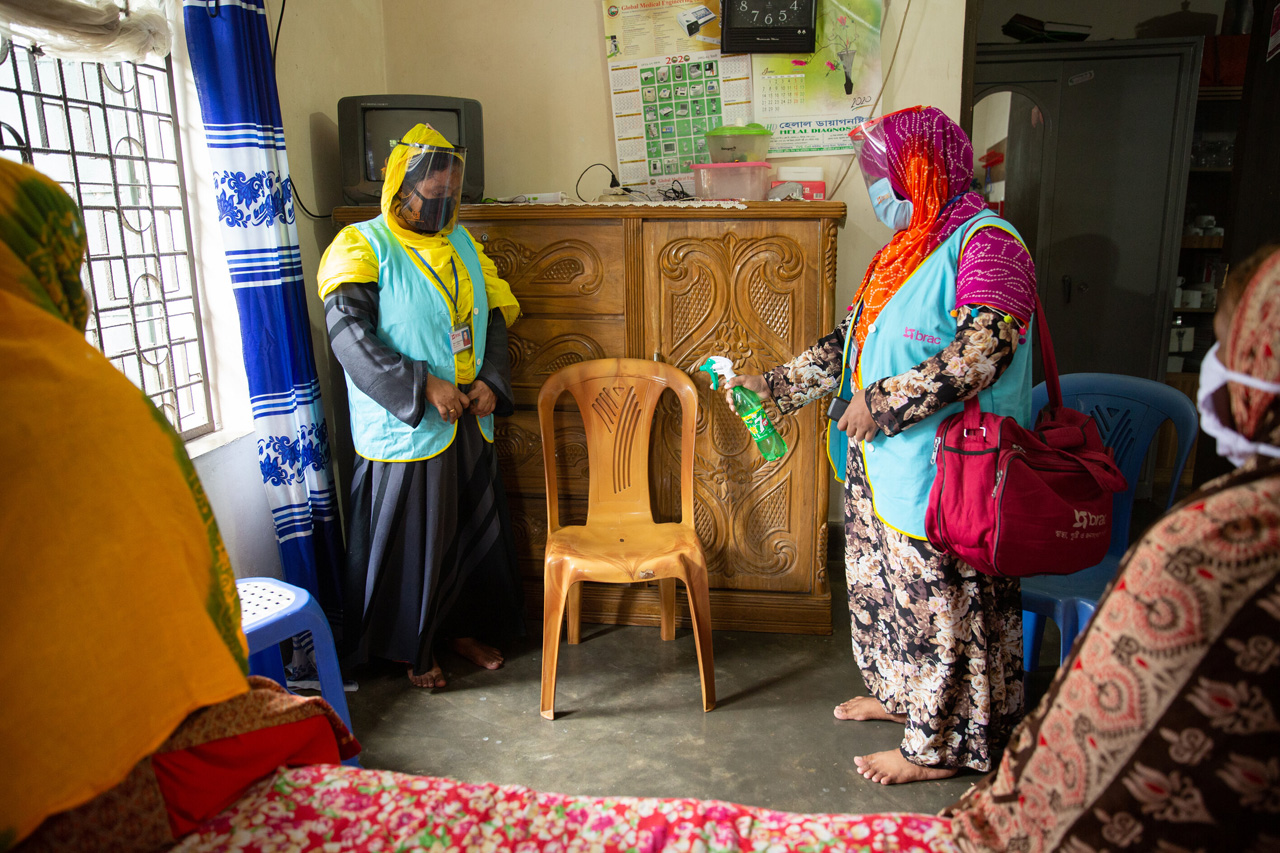
BRAC has taken up an initiative to support people living in the 38 high risk districts across Bangladesh. BRAC along with partner NGOs are all set to implement the plan through a community-driven COVID response and local level health system strengthening initiative. The decision was reached at an emergency meeting with the recently formed platform Civil Society Organisation (CSO) Alliance today on Thursday (15 April). The meeting decided that NGOs will collaboratively work across Bangladesh under an initiative styled ‘Community resilience to prevent coronavirus’ (করোনা প্রতিরোধে সামাজিক দূর্গ).
The emergency meeting was chaired by Civil Society Organisation (CSO) Alliance coordinator and advisor to former caretaker government Rasheda K Chowdhury. PRIP Trust executive director Aroma Dutta, Ahsania Mission ED Dr M Ehsanur Rahman, Hasin Jahan, Sultana Kamal, Maleka Banu, RDRS chairperson Shib Narayan Kairy and WaterAid regional director Khairul Islam also attended the meeting.
With this initiative, the NGOs together will work on spreading information on coronavirus prevention, proper use of masks and vaccine registration along with spreading awareness messages and addressing misinformation to around 58 million people living in the 38 high risk districts.
The high-risk districts with case positivity rate above 10 percent are: Dhaka, Chottogram, Rangamati Sylhet, Moulvibazar, Munshiganj, Narsingdi, Khulna, Narayanganj, Rajbari, Feni, Noakhali, Chandpur, Shariatpur, Laxmipur, Cumilla, Barisal, Rajshahi, Bogura, Narail, Nilphamari, Gazipur, Faridpur, Brahmanbaria, Jessore, Madaripur, Naogaon, Rangpur, Kishoreganj, Natore, Tangail, Pirojpur, Patuakhali, Bhola, Manikganj, Gaibandha, Dinajpur, and Mymensingh.
With the rising COVID cases, increasing number of deaths, overburdened hospitals and acute crisis in ICU facilities in Bangladesh, community level prevention with a central approach has become an emergency now.
On one hand the healthcare professionals are struggling to manage the influx of patients, while on the other people still remain mostly negligent towards following the preventive measures and healthcare guidelines. In this context a stronger focus on behavioural change and community engagement to prevent and manage COVID becomes inevitable.
About the initiative, BRAC executive director Asif Saleh said, “The fight against coronavirus prevention requires long-term initiative. It is not possible to win the fight without participation from communities. We are mobilising internal resources to initiate the programme and calling on donors and partners to come forward to scale it up. This low cost model will lead to long term benefits if it can get proper financing, and will also speed up the government’s coronavirus prevention efforts.”
BRAC in partnership with The Foreign, Commonwealth & Development Office (FCDO) of the Government of UK and under a joint initiative with the Directorate General of Health Services (DGHS) and Community Clinic Trust has piloted a community-driven COVID response and health system strengthening initiative in six districts over the past five months. Based on the success of the pilot, BRAC will scale this initiative across the 38 high risky districts identified by Institute of Epidemiology Disease Control and Research (IEDCR). BRAC will work together with partner organisations on the ground to slow down the spread of COVID-19, help flatten the curve and preserve health system capacity in these high risk districts. The initiative will have three key pillars of interventions: prevention, response to COVID case management, and promoting vaccination.
Prevention: BRAC and partners will ensure mask use, hand hygiene and social distancing through household education. Community groups will be engaged in awareness activities and rapid response. In addition, local government officials, volunteers and community leaders will be empowered with knowledge on COVID-19 related issues to ensure preventive behaviours at hotspots such as mosques, transport hubs, markets, shops, etc. Periodic assessment will be conducted to see behavioural change in the community. BRAC’s observation shows that decrease in mask use is directly related to an increase in COVID positivity rate. Hence, stronger focus needs on prevention.
Response: BRAC’s proven Community Support Team (CST ) model led by frontline community health workers will be scaled for syndromic surveillance at household level. These community based teams will identify suspected COVID-19 cases by visiting households with potential cases (identified via word of mouth approach) to conduct screening. Individuals matching with sets of clinical criteria will be connected to the telemedicine services for further support. These households will also receive information on home management of mild and moderate cases, possible referral points and testing facilities, quarantine protocols and best practices to prevent further spread of infection among the household members. Follow-ups will be conducted to ensure quarantine compliance.
Vaccination: BRAC and partners will support the local government health office for COVID-19 vaccination registration and mobilisation. BRAC’s 50,000 community health workers and volunteers will actively engage in addressing myths and rumors creating vaccine hesitancy at the community level. Furthermore, vaccination will also be promoted in each of the districts through local level miking and message dissemination via national TV, radio, newspaper and social media.
BRAC-BUHS rapid assessment on impact of covid-19 on essential healthcare services
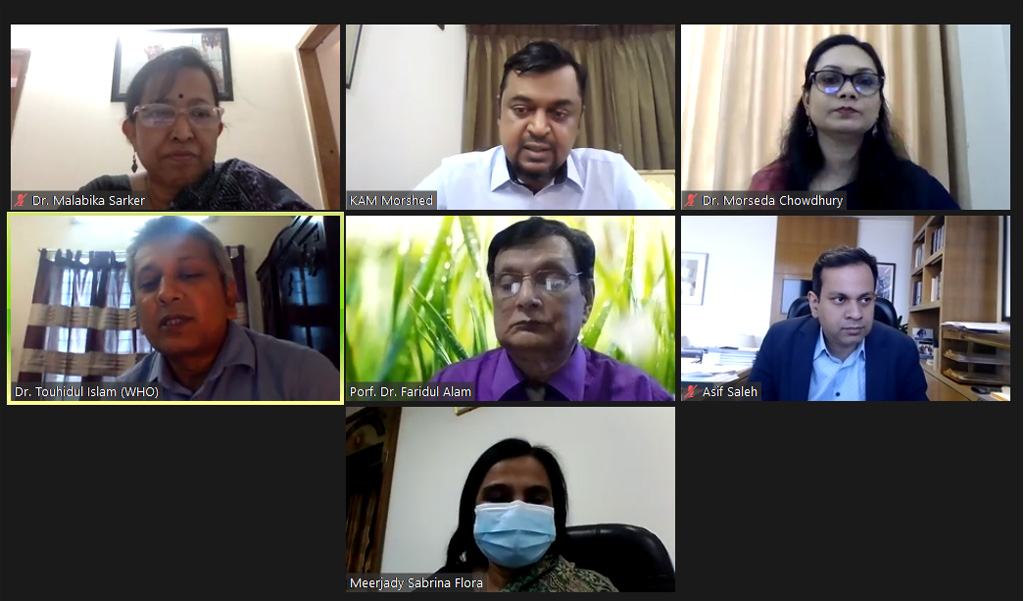
Antenatal care, postnatal care, under-5 vaccination, healthcare of emergency and chronic illness patients, elderly people and persons with disabilities suffered worse
A rapid assessment on the situation of essential healthcare in Bangladesh during the Covid-19 stresses that a number of areas of public health need enhanced effort to continue the fruits the nation had gained until the pandemic broke out last year.
According to the study report, pregnant mothers, mothers with newborns, vaccination of children below five years of age, patients needing emergency care and those with chronic illnesses, elderly people and persons with disabilities are suffering worse than others in terms of healthcare services during the ongoing pandemic situation. To remedy this situation, the report recommends that multi-faceted initiatives should be undertaken on a short and long term basis.
The findings and recommendations of the study titled “Impact of COVID-19 on Essential Health Services in Bangladesh: A rapid assessment” were shared at an online event organised by BRAC today on Sunday (11 April 2021). BRAC’s Advocacy for Social Change programme and Bangladesh University of Health Sciences (BUHS) conducted the study, which was commissioned by BRAC’s Health, Nutrition and Population Programme (HNPP).
Professor Meerjady Sabrina Flora, additional director general (planning), Directorate General of Health Services (DGHS),and Asif Saleh, Executive Director, BRAC were in presence as Chief Guest and Special Guest respectively.
In her speech, Professor Meerjady Sabrina Flora said covid-19 not only created sufferings for coronavirus patients or non-covid patients only, but it has also affected the government’s successful health programs and disease prevention programs as well.
“Along with the general people, the government wants to work together with committed associate organisations not only for covid-19 containment, but also to ensure essential healthcare facilities for all where partnering organisations will have equal partnership in the process being led by the government,” she said.
BRAC executive director Asif Saleh said, “Strengthening of the community system has become extremely important since covid-19 is not going away within two or two and a half years. BRAC wants to work in the field of prevention, protection and mobilisation.”
He also said, “Last year, we worked on community mobilisation in Gazipur and later expanded the service in six districts with support from FCDO. The project brings fruitful outcome as the transmission rate is lower in the districts now and the rate of vaccination is comparatively higher. Now, we want to spread this program to the areas across Bangladesh, particularly in areas where transmission rate is higher. Also, BRAC is ready to provide technical assistance to other NGOs in places where BRAC does not operate.”
Following the presentation on findings, a panel discussion was addressed by, among others, Dr Morseda Chowdhury, associate director, HNPP, and Professor Faridul Alam, vice chancellor, BUHS. Professor Dr Malabika Sarker, associate dean, James P Grant School of Public Health at BRAC University, and Dr. Md. Touhidul Islam, National Professional Officer at World Health Organization also spoke in the panel. KAM Morshed, senior director, BRAC, moderated the panel discussion.
Carried out between April and August in 2020, the rapid assessment covered randomly selected 2,483 households with an average family size of 4.89 people in 16 districts of eight divisions. The survey found that 167 of the households had pregnant women during the survey period. A total of 49 babies aged from 0-28 days were found in the surveyed households. There were 794 under-five children which covers 32% of total household members.
According to the report, 60.8% of households experienced some form of sickness (other than COVID-19), while 28.6% reported higher clinical costs. 10% of households reported difficulty in availing health services from hospitals. Two fifths of households reported that their health status had deteriorated due to lack of proper healthcare.
The situation was particularly worse for women and children. 54% of pregnant women did not get all the services which were provided to pregnant mothers before the pandemic. According to the 2017-18 data of DGHS, on average 47% pregnant women received 4 visits for antenatal care (ANC). This study found that 37.6% pregnant women received 4 ANC services during the survey period, which is around 10% lower than the national average. 20% of deliveries were conducted by untrained midwives during the survey period. One in seven children was not taken to hospitals when they fell seriously ill mainly due to the high transportation cost and fear of covid-19. The overall situation was much worse in rural areas compared to the urban ones.
Patients with chronic diseases also suffered significantly. 56.32% of chronic disease patients reported that fear of coronavirus barred them from seeking treatment, while 54.51% reported financial difficulties. Treatment for mental illnesses and disabilities was of particularly poor state, more so in rural areas.
Despite high initial demand, telemedicine services were only utilised by 6% of households surveyed. The most common reason cited was that service seekers could not explain their symptoms properly.
Speaking at the panel discussion, Professor Faridul Alam, vice chancellor, BUHS said, the health sector in Bangladesh is poorly structured and this is why it cannot face any emergency. He demanded to transfer the healthcare system to the local health authority.
Professor Dr Malabika Sarker, associate dean, James P Grant School of Public Health at BRAC University, called upon the authorities to provide technological training and other institutional support to the field level health workers to build their capacity.
Dr. Md. Touhidul Islam, National Professional Officer at World Health Organization, said, “The government need to shift its focus from infrastructural development to more human development and invest in places where it is needed.”
To mitigate the challenges in the healthcare service delivery caused by the pandemic a number of recommendations were made in study. Priorities among these are, revisiting the national service delivery system in the context of the ongoing pandemic, robust utilisation of information and communications technologies, strengthening of health information systems and boosting the efficacy of coordination tasks. Adequate recruitment of health workforce and training to equip them with necessary mix of skills, while installing modern diagnostic and medical equipment are also crucial. Improving the effectiveness of referral mechanisms should be focused. Lastly, rethinking of the health financing is essential to build and sustain an adequately strong universal healthcare system in Bangladesh.
Unity of NGOs must for effective collaboration with govt to sustain development
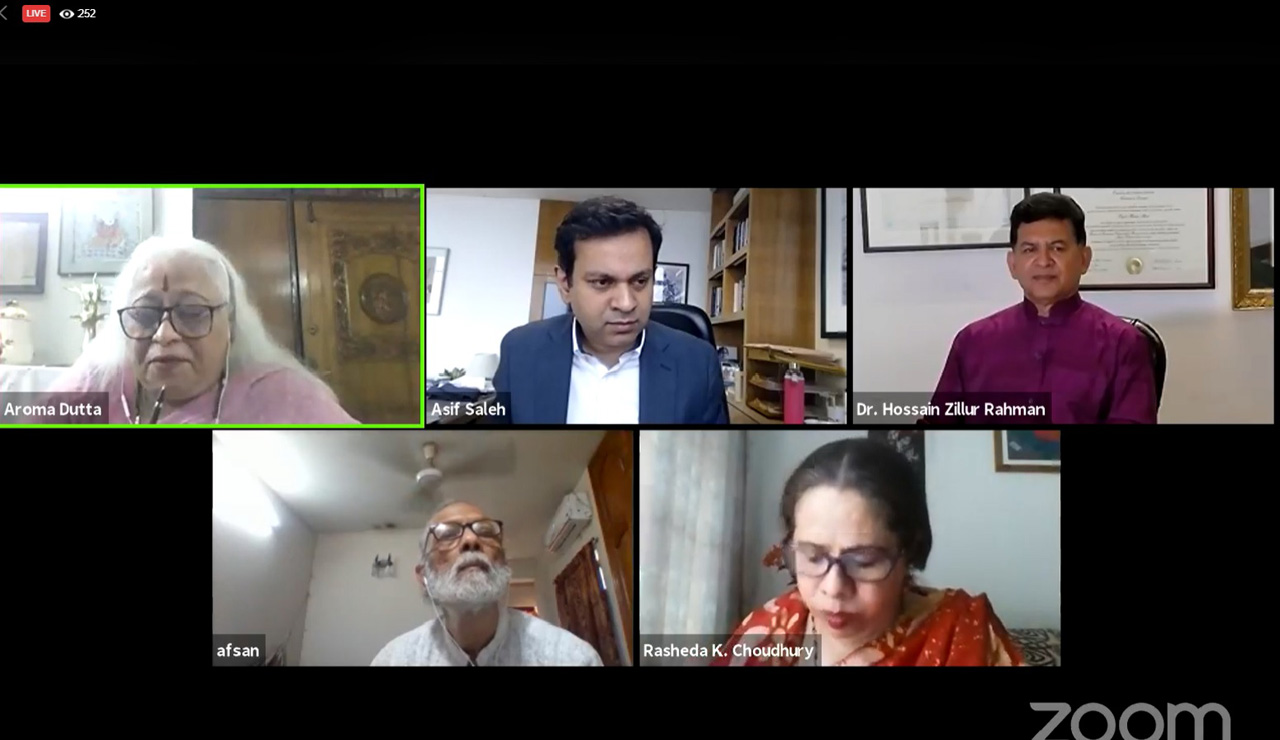
Non-governmental organisations must be united to continue sustainable development of future Bangladesh and ensure timely and quality services for the grassroots. Effective collaboration between the government and NGOs is also a prerequisite to sustain the fruits of development. These observations came from the speakers at an online discussion, marking 49th anniversary of BRAC.
As the nation counts down to celebrate the 50th anniversary of the great independence of Bangladesh, BRAC, one of its largest development partners, is also completing the 49th year of its establishment. To mark the occasion, BRAC organised an online discussion session titled “Bangladesh and BRAC: Collaboration for development” today on Sunday (21 March).
Moderated by executive director Asif Saleh, discussants at the event were Dr Hossain Zillur Rahman, chairperson of BRAC and former adviser to the Caretaker Government, Aroma Dutta, member of parliament and executive director at Prip Trust, Rasheda K Choudhury, executive director at Campaign for Popular Education (CAMPE) and former adviser to the Caretaker Government, and Afsan Chowdhury, eminent researcher and senior journalist.
Founded in 1972, BRAC innovated frugal and effective solutions in socio-economic sectors, including education, health and nutrition, microfinance and social enterprises, women development, human rights and legal aid, agriculture and food security, urban development, road safety, climate change impacts, skills development, migration and extreme poverty.
Its graduation model to tackle extreme poverty through combined services of handing over assets for income generation, livelihood and life skills training, health and education is now implemented by many agencies and governments across the globe in 46 countries. In the last nearly five decades, BRAC maintained the journey of liaison with the government of Bangladesh and other partners to bring essential services and opportunities for self-development at the door of the marginalised and poorest people.
Having praised BRAC for its role in empowerment of women reducing gender discrimination, lawmaker Aroma Dutta said in her discussion, “Bangladesh today is the best example of women empowerment in the world. Certainly, there were government initiatives, but it is BRAC that has brought the most remarkable changes at the field level. The government also expects BRAC’s cooperation in these initiatives.”
Speaking on BRAC’s role in achieving universal education in Bangladesh and its future strategy, CAMPE executive director Rasheda K Choudhury said, “It’s as though BRAC, Bangladesh and Abed Bhai have become synonymous. BRAC was at the heart of non-formal education. Yet why did Abed Bhai (Sir Fazle Hasan Abed) create a separate platform of CAMPE? He actually came up with the idea of forming this new coalition in the 1990s with the objective to put pressure on the government to focus on the development of the education sector. And it was a success. With the CAMPE’s initiative, students going to NGO-run schools began to get government textbooks for free from 2009.”
Eminent researcher and senior journalist Afsan Chowdhury commended BRAC for its collaboration with the government in implementing the national social development policies. “BRAC is formulating its action strategies keeping in view the demands of the people of this country and not giving priority to the western ideas of development. On the programme BRAC initiated for the ultra poor communities, Abed Bhai used to say that the programme would benefit the extreme poor to become self-dependent instead of becoming burdened with loans. He took initiatives to develop market for the poor.”
BRAC chairperson Dr Hossain Zillur Rahman focused on the organisation’s strategy for poverty alleviation and better living standard. “The greatest achievement of BRAC and Abed Bhai is that they have consolidated the role and work of NGOs in Bangladesh and by doing that they inspired the grassroots people to become self-confident.”
“Focusing on the opinions of the marginalised people in formulating their action strategies and taking up own income generation initiatives instead of depending on donor assistance are the two other major achievements,” he further observed, saying that the latter idea is the genesis of social enterprises in the development sector.
Please find the video: https://www.facebook.com/BRACWorld/videos/789330828350895
BRAC wins ICMAB Best Corporate Award

The Institute of Cost & Management Accountants of Bangladesh (ICMAB) has awarded BRAC the first position in the ICMAB Best Corporate Award-2019.
BRAC, the number one NGO in the world, has secured Gold Award under NGO Category in the competition.
Tipu Munshi MP, Hon’ble Minister, Ministry of Commerce, Government of People’s Republic of Bangladesh handed over the award to Ashit Baran Das, Associate Director (Finance & Accounts) of BRAC at a ceremony organized at Radisson Blu Dhaka Water Garden in Dhaka today evening (Thursday, February 25, 2021).
Professor Shibli Rubayat-Ul-Islam, Chairman, Bangladesh Securities and Exchange Commission (BSEC), Dr. Md Jafar Uddin, Secretary, Ministry of Commerce, Government of People’s Republic of Bangladesh, Sheikh Fazle Fahim, President, The Federation of Bangladesh Chambers of Commerce and Industry (FBCCI), A.K.M. Delwar Hussain FCMA, President, South Asian Federation of Accountants (SAFA) were also present as the special guests in the event.
BRAC received many awards in the field of financial transparency in different times including Institute of Chartered Accountants of Bangladesh (ICAB) National Award under the category of NGOs, Institute of Cost and Management Accountants of Bangladesh (ICMAB) Best Corporate Award in the NGO category, and prestigious South Asian Federation of Accountants (SAFA) award for best presented annual report in the non-governmental organisation category.
New platform of NGOs and citizen organisations launched in Bangladesh
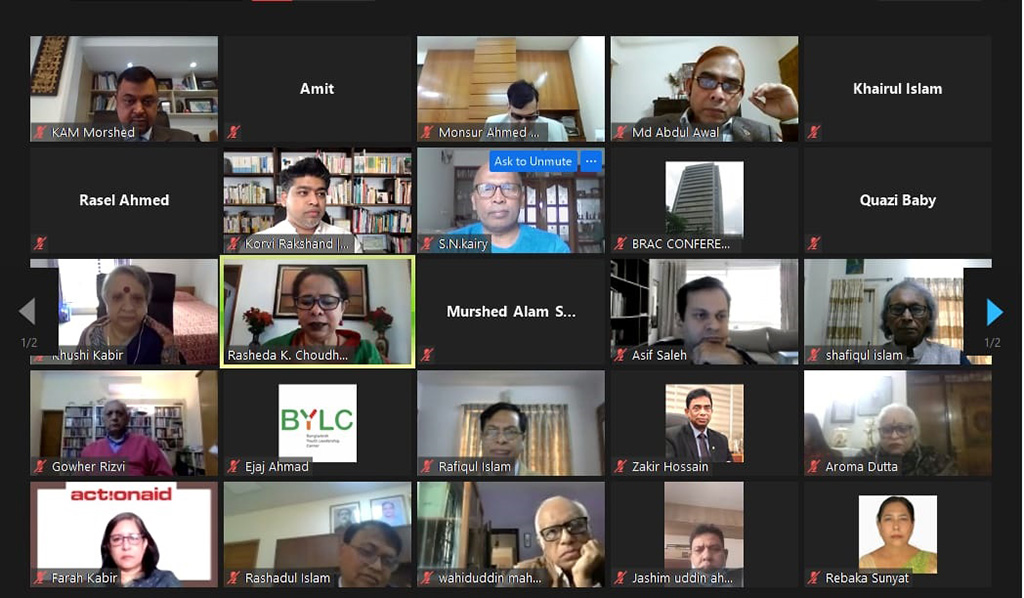
Dr Gowher Rizvi, international affairs adviser to the prime minister, said, “NGOs have immense contribution in the development of Bangladesh. The citizen groups have been actively engaged in their role since the birth of Bangladesh. Formation of a greater platform bringing the development organisations and civil society groups together is a positive initiative indeed. An important task of this platform will be to have in-depth research to find solutions for hunger, poverty and lack of education. It will then help build successful advocacy.” He made these remarks while speaking as the chief guest at a virtual event organised to announce the formation of a greater platform of civil society organisations of Bangladesh.
He further viewed that the newly founded platform can play a very important role for Bangladesh to achieve its SDG 2030 targets. Bangladesh must be able to deal with these challenges more efficiently, while it advances towards graduating to a middle income country. We should now reach the disadvantaged and deprived communities with services on priority basis, Dr Rizvi said.
The event was organised on the morning today on Tuesday (22 December) with NGO Affairs Bureau director-general Md Rashadul Islam and eminent economist Professor Wahid Uddin Mahmud present as special guests.
At the virtual programme, the organisers focused on the mission, objectives and next steps of the newly founded platform. They also announced that BRAC will be its secretariat for first two years.
Having called for everyone to engage in a concerted manner in tackling COVID-19 pandemic, NGO Affairs Bureau director-general Md Rashadul Islam said collaborative efforts will take our country to the targeted position of development. The NGO Affairs Bureau will give all possible assistance in this regard, he also pledged.
“Creating a collaborative relation with the government as well as forming common platform for all the non-governmental organisations are exceedingly important tasks for ensuring inclusive development and establishing a progressive society. The service giving development organisations are a big strength for Bangladesh,” said eminent economist Professor Wahid Uddin Mahmud, who further stressed that the government has to act pro-actively for enabling the development organisations to operate with freedom while maintaining accountability and commitment.
Leaders of over 500 NGOs and civil society organisations were present at the virtual event chaired by Rasheda K Chowdhury, chairperson, Campaign for Popular Education (CAMPE), and former adviser to the Caretaker Government, and moderated by BRAC’s senior director KAM Morshed.
The organisers at the event said that the NGOs have become a centre of learning for the development practitioners across the world for their important role in the development of the socio-economic sectors of Bangladesh. However, despite the impressive achievements of the sector particularly in the health, education and women empowerment, effective coordination and representation remained a big challenge for the NGO sector especially in the last two decades. This problem was most seriously felt when the government, having formulated the ‘Foreign Donations (Voluntary Activities) Regulation Law’ published it on the website of the NGO Affairs Bureau in January of 2012, and called for opinions.
In the absence of a national platform the development and civil society organisations found it difficult to discuss on the draft law and come out with concrete suggestions. This context as well as to enable the NGOs play their role more effectively in tackling the COVID situation, such a platform has become more necessary than ever.
Former BRAC chairperson late Sir Fazle Hasan Abed took special initiative in this regard and during his final days he started consultations with many NGO leaders. Inspired by his wish and effort, BRAC began the discussion anew in February of the current year (2020) and organised a series of meetings also.
The objectives of the proposed CSO platform are – Acting in collaboration with the government in finding effective solutions for the issues such as graduating to middle income country, fourth industrial revolution, climate change impact, COVID-induced challenges facing the health sector. Creating opportunity for CSOs to exchange their acquired knowledge and experience is also an objective. Celebrating together 50 years of independence of Bangladesh is also part of the objective of the new platform.
Aroma Dutta, member of parliament, Dr Fahmida Khatun, executive director, CPD, Asif Saleh, executive director, BRAC, Khusi Kabir, coordinator, Nijera Kori, Dr Maleka Banu, general secretary, Bangladesh Mohila Parishad, Shahin Anam, executive director, Manusher Jonno Foundation, Sharif Jamil, general secretary, Bangladesh Poribesh Andolon, Karavi Rakhsan, founder, Jago Foundation, Farah Kabir, Bangladesh country director, Action Aid, Sanjib Drong, general secretary, Bangladesh Adivasi Forum, Shafiqul Islam, representative, INGO Forum, and Mansur Ahmed Chowdhury, managing director, Bangladesh Jatiya Protibondhi Kalyan Foundation, spoke at the event, among others.
Join the world’s biggest family

